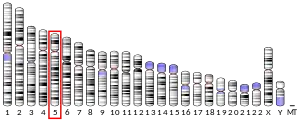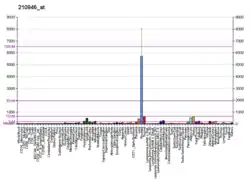Lipid phosphate phosphohydrolase 1 also known as phosphatidic acid phosphatase 2a is an enzyme that in humans is encoded by the PPAP2A gene.[3][4]
Function
Lipid phosphate phosphohydrolase 1 is a member of the phosphatidic acid phosphatase (PAP) family. PAPs convert phosphatidic acid to diacylglycerol, and function in de novo synthesis of glycerolipids as well as in receptor-activated signal transduction mediated by phospholipase D. This protein is an integral membrane glycoprotein, and has been shown to be a surface enzyme that plays an active role in the hydrolysis and uptake of lipids from extracellular space. The expression of this gene is found to be regulated by androgen in a prostatic adenocarcinoma cell line. At least two alternatively spliced transcript variants encoding distinct isoforms have been described.[4]
References
- 1 2 3 GRCh38: Ensembl release 89: ENSG00000067113 - Ensembl, May 2017
- ↑ "Human PubMed Reference:". National Center for Biotechnology Information, U.S. National Library of Medicine.
- ↑ Kai M, Wada I, Imai S, Sakane F, Kanoh H (Oct 1997). "Cloning and characterization of two human isozymes of Mg2+-independent phosphatidic acid phosphatase". J Biol Chem. 272 (39): 24572–24578. doi:10.1074/jbc.272.39.24572. PMID 9305923.
- 1 2 "Entrez Gene: PPAP2A phosphatidic acid phosphatase type 2A".
Further reading
- Kanoh H, Kai M, Wada I (1999). "Molecular characterization of the type 2 phosphatidic acid phosphatase". Chem. Phys. Lipids. 98 (1–2): 119–126. doi:10.1016/S0009-3084(99)00024-9. PMID 10358934.
- Nanjundan M, Possmayer F (2003). "Pulmonary phosphatidic acid phosphatase and lipid phosphate phosphohydrolase". Am. J. Physiol. Lung Cell Mol. Physiol. 284 (1): L1–23. doi:10.1152/ajplung.00029.2002. PMID 12471011.
- Ulrix W, Swinnen JV, Heyns W, Verhoeven G (1998). "Identification of the phosphatidic acid phosphatase type 2a isozyme as an androgen-regulated gene in the human prostatic adenocarcinoma cell line LNCaP". J. Biol. Chem. 273 (8): 4660–4665. doi:10.1074/jbc.273.8.4660. PMID 9468526.
- Leung DW, Tompkins CK, White T (1998). "Molecular cloning of two alternatively spliced forms of human phosphatidic acid phosphatase cDNAs that are differentially expressed in normal and tumor cells". DNA Cell Biol. 17 (4): 377–385. doi:10.1089/dna.1998.17.377. PMID 9570154.
- Hooks SB, Ragan SP, Lynch KR (1998). "Identification of a novel human phosphatidic acid phosphatase type 2 isoform". FEBS Lett. 427 (2): 188–192. doi:10.1016/S0014-5793(98)00421-9. PMID 9607309. S2CID 31610109.
- Roberts R, Sciorra VA, Morris AJ (1998). "Human type 2 phosphatidic acid phosphohydrolases. Substrate specificity of the type 2a, 2b, and 2c enzymes and cell surface activity of the 2a isoform". J. Biol. Chem. 273 (34): 22059–22067. doi:10.1074/jbc.273.34.22059. PMID 9705349.
- Neumann J, Maas R, Bokník P, et al. (1999). "Pharmacological characterization of protein phosphatase activities in preparations from failing human hearts". J. Pharmacol. Exp. Ther. 289 (1): 188–93. PMID 10087003.
- Moreno CS, Park S, Nelson K, et al. (2000). "WD40 repeat proteins striatin and S/G(2) nuclear autoantigen are members of a novel family of calmodulin-binding proteins that associate with protein phosphatase 2A". J. Biol. Chem. 275 (8): 5257–5263. doi:10.1074/jbc.275.8.5257. PMC 3505218. PMID 10681496.
- Roberts RZ, Morris AJ (2001). "Role of phosphatidic acid phosphatase 2a in uptake of extracellular lipid phosphate mediators". Biochim. Biophys. Acta. 1487 (1): 33–49. doi:10.1016/s1388-1981(00)00081-0. PMID 10962286.
- Woetmann A, Brockdorff J, Lovato P, et al. (2003). "Protein phosphatase 2A (PP2A) regulates interleukin-4-mediated STAT6 signaling". J. Biol. Chem. 278 (5): 2787–2791. doi:10.1074/jbc.M210196200. PMID 12426308.
- Pandey AV, Mellon SH, Miller WL (2003). "Protein phosphatase 2A and phosphoprotein SET regulate androgen production by P450c17". J. Biol. Chem. 278 (5): 2837–2844. doi:10.1074/jbc.M209527200. PMID 12444089.
- Strausberg RL, Feingold EA, Grouse LH, et al. (2003). "Generation and initial analysis of more than 15,000 full-length human and mouse cDNA sequences". Proc. Natl. Acad. Sci. U.S.A. 99 (26): 16899–16903. Bibcode:2002PNAS...9916899M. doi:10.1073/pnas.242603899. PMC 139241. PMID 12477932.
- Smyth SS, Sciorra VA, Sigal YJ, et al. (2003). "Lipid phosphate phosphatases regulate lysophosphatidic acid production and signaling in platelets: studies using chemical inhibitors of lipid phosphate phosphatase activity". J. Biol. Chem. 278 (44): 43214–43223. doi:10.1074/jbc.M306709200. PMID 12909631.
- Tanyi JL, Hasegawa Y, Lapushin R, et al. (2004). "Role of decreased levels of lipid phosphate phosphatase-1 in accumulation of lysophosphatidic acid in ovarian cancer". Clin. Cancer Res. 9 (10 Pt 1): 3534–45. PMID 14506139.
- Gerhard DS, Wagner L, Feingold EA, et al. (2004). "The status, quality, and expansion of the NIH full-length cDNA project: the Mammalian Gene Collection (MGC)". Genome Res. 14 (10B): 2121–2127. doi:10.1101/gr.2596504. PMC 528928. PMID 15489334.
- Grkovich A, Johnson CA, Buczynski MW, Dennis EA (2006). "Lipopolysaccharide-induced cyclooxygenase-2 expression in human U937 macrophages is phosphatidic acid phosphohydrolase-1-dependent". J. Biol. Chem. 281 (44): 32978–32987. doi:10.1074/jbc.M605935200. PMID 16950767.
- Kai M, Sakane F, Jia YJ, et al. (2007). "Lipid phosphate phosphatases 1 and 3 are localized in distinct lipid rafts". J. Biochem. 140 (5): 677–686. doi:10.1093/jb/mvj195. PMID 17005594.



